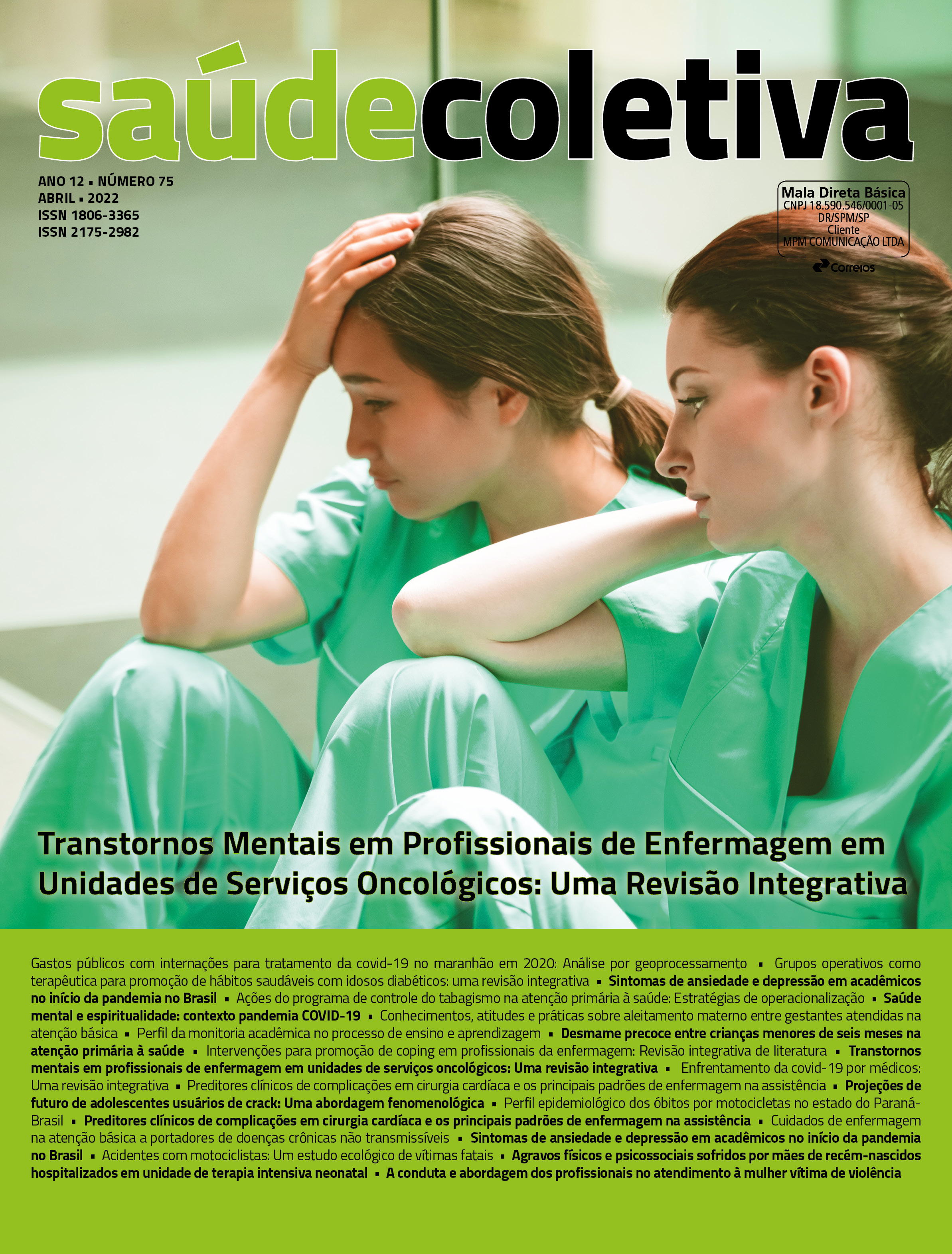Motorcyclist accidents: An ecological study of fatal victims
DOI:
https://doi.org/10.36489/saudecoletiva.2022v12i75p10273-10283Keywords:
Traffic Accidents, Mortality, MotorcyclesAbstract
OBJECTIVE: To analyze traffic accidents with fatal outcomes involving motorcyclists. METHODS: Descriptive, ecological study of fatal victims of traffic accidents with motorcyclists in the city of Maringá/PR, from January 1, 2015 to August 31, 2020. As a database, information from the police reports was used of the Military Police. Data analysis was performed using descriptive statistics and variable frequencies were calculated using the R 3.2.3 software. RESULTS: 231 people were victims of traffic accidents, 57.57% of which were motorcyclists. Of the fatal victims resulting from the motorcycle event, the following predominated: males (87.22%), aged between 19 and 39 years (70.67%), with events that occurred from Monday to Friday (62.41%). CONCLUSION: It is essential to reinforce traffic education and adjust public traffic policies for the category with the greatest victims, such as motorcyclists.
References
, Brasil M da S. Boletim epidemiológico especial. 2021. p. 1–85.
Governo do Estado de Goiás B. DECRETO No 9.633, DE 13 DE MARÇO DE 2020 -. 2020.
Elmer T, Mepham K, Stadtfeld C. Students under lockdown: Comparisons of students’ social networks and mental health before and during the COVID-19 crisis in Switzerland. PLoS ONE [Internet]. 2020;15(7 July):1–22. Available from: http://dx.doi.org/10.1371/journal.pone.0236337
Guse J, Heinen I, Kurre J, Mohr S, Bergelt C. Perception of the study situation and mental burden during the covid-19 pandemic among undergraduate medical students with and without mentoring. GMS Journal for Medical Education. 2020;37(7):1–9.
Huckins JF, da Silva AW, Wang W, Hedlund E, Rogers C, Nepal SK, et al. Mental health and behavior of college students during the early phases of the COVID-19 pandemic: Longitudinal smartphone and ecological momentary assessment study. Journal of Medical Internet Research. 2020;22(6).
Maia BR, Dias PC. Anxiety, depression and stress in university students: The impact of COVID-19. Estudos de Psicologia (Campinas). 2020;37:1–8.
Wang X, Hegde S, Son C, Keller B, Smith A, Sasangohar F. Investigating mental health of US college students during the COVID-19 pandemic: Cross-sectional survey study. Journal of Medical Internet Research. 2020;22(9).
Kleiman EM, Yeager AL, Grove JL, Kellerman JK, Kim JS. Real-time mental health impact of the COVID-19 pandemic on college students: ecological momentary assessment study. JMIR Mental Health. 2020;7(12).
Li T, Zhang X, Chen M, Wang R, He L, Xue B, et al. Psychological distress and its associated risk factors among university students. Revista da Associacao Medica Brasileira. 2020;66(4):414–8.
Fernandes MA, Vieira FER, Silva JS e, Avelino FVSD, Santos JDM. Prevalence of anxious and depressive symptoms in college students of a public institution. Revi Bras Enferm [Internet]. 2018;71(suppl 5):2298–304. Available from: http://myaccess.library.utoronto.ca/login?url=http://search.ebscohost.com/login.aspx?direct=true&db=rzh&AN=132862734&site=ehost-live
Zigmond AS, Snalth RP. The Hospital Anxiety and Depression Scale. Acta psychiatr. scand. [revista en Internet] 2014 [acceso 28 de noviembre de 2019]; 64(5): 361-370. Acta psychiatrica scandinavica [Internet]. 1983;67(6):361–70. Available from: https://www.ncbi.nlm.nih.gov/pubmed/6880820
Botega NJ, Bio MR, Zomignani MA, Garcia Jr C, Pereira WAB. Transtornos do humor em enfermaria de clínica médica e validação de escala de medida (HAD) de ansiedade e depressão. Revista de Saúde Pública. 1995;29(5):359–63.
Ribeiro CF, Lemos CMC, Alt NN, Marins RLT, Corbiceiro WCH, Nascimento MI do. Prevalence of and Factors Associated with Depression and Anxiety in Brazilian Medical Students. Revista Brasileira de Educação Médica. 2020;44(1):1–8.
Castaldelli-Maia JM, Lewis T, Marques dos Santos N, Picon F, Kadhum M, Farrell SM, et al. Stressors, psychological distress, and mental health problems amongst Brazilian medical students. International Review of Psychiatry [Internet]. 2019;31(7–8):603–7. Available from: https://doi.org/10.1080/09540261.2019.1669335
Flesch BD, Houvèssou GM, Munhoz TN, Fassa AG. Episódio depressivo maior entre universitários do sul do Brasil. Revista de Saúde Pública [Internet]. 2020;54:11. Available from: http://www.rsp.fsp.usp.br/
Graner KM, Cerqueira ATDAR. Integrative review: Psychological distress among university students and correlated factors. Ciencia e Saude Coletiva. 2019;24(4):1327–46.
Leão AM, Gomes IP, Ferreira MJM, Luciano Pamplona de Góes Cavalcanti. Prevalência e fatores associados à depressão e ansiedade entre estudantes universitários da área da saúde em um grande centro urbano do nordeste do Brasil. Revista Brasileira De Educação Médica. 2018;42(4):55–65.
Ghandour R, Ghanayem R, Alkhanafsa F, Alsharif A, Asfour H, Hoshiya A, et al. Double burden of covid-19 pandemic and military occupation: Mental health among a palestinian university community in the west bank. Annals of Global Health. 2020;86(1):1–11.
Id AK, Basch CH, Sullivan M, Davi NK. The impact of the COVID-19 epidemic on mental health of undergraduate students in New Jersey , cross-sectional study. 2020;1–16. Available from: http://dx.doi.org/10.1371/journal.pone.0239696
Saraswathi I, Saikarthik J, Kumar KS, Srinivasan KM, Ardhanaari M, Gunapriya R. Impact of COVID-19 outbreak on the mental health status of undergraduate medical students in a COVID-19 treating medical college: A prospective longitudinal study. PeerJ. 2020;8.
Baron, MV; Vigano, AJP; Scherer, GDLG.; Velho, IK; Santos, MMD; Silveira, JB; Costa, BEP. Impactos da COVID-19 na saúde mental da população chinesa no início da epidemia: Revisão Integrativa. Rev Saúde Coletiva. 2020;54(10): 2661-69.







